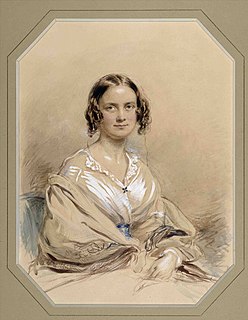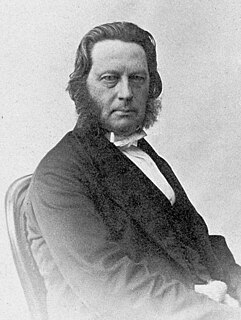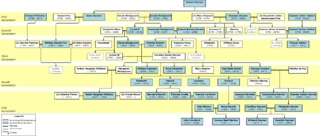Related Research Articles

Alfred Russel Wallace was a British naturalist, explorer, geographer, anthropologist, biologist and illustrator. He is best known for independently conceiving the theory of evolution through natural selection; his paper on the subject was jointly published with some of Charles Darwin's writings in 1858.This prompted Darwin to publish On the Origin of Species.

Darwinism is a theory of biological evolution developed by the English naturalist Charles Darwin (1809–1882) and others, stating that all species of organisms arise and develop through the natural selection of small, inherited variations that increase the individual's ability to compete, survive, and reproduce. Also called Darwinian theory, it originally included the broad concepts of transmutation of species or of evolution which gained general scientific acceptance after Darwin published On the Origin of Species in 1859, including concepts which predated Darwin's theories. English biologist Thomas Henry Huxley coined the term Darwinism in April 1860.

On the Origin of Species, published on 24 November 1859, is a work of scientific literature by Charles Darwin that is considered to be the foundation of evolutionary biology. Darwin's book introduced the scientific theory that populations evolve over the course of generations through a process of natural selection. The book presented a body of evidence that the diversity of life arose by common descent through a branching pattern of evolution. Darwin included evidence that he had collected on the Beagle expedition in the 1830s and his subsequent findings from research, correspondence, and experimentation.

Social Darwinism refers to various theories that emerged in Western Europe and North America in the 1870s that applied biological concepts of natural selection and survival of the fittest to sociology, economics and politics. Social Darwinism posits that the strong see their wealth and power increase while the weak see their wealth and power decrease. Various social Darwinist schools of thought differ on which groups of people are the strong and which are the weak, and also differ on the precise mechanisms that reward strength and punish weakness. Many such views stress competition between individuals in laissez-faire capitalism, while others, emphasizing struggle between national or racial groups, support nationalism, authoritarianism, eugenics, racism, imperialism, and/or fascism. The ideology of social Darwinism inspired the perpetrators of genocides including the Armenian genocide.
Baron Milner of Leeds, of Roundhay in the City of Leeds, is a title in the Peerage of the United Kingdom. It was created on 20 December 1951 for the Labour politician James Milner. His only son, the second Baron, was one of the ninety elected hereditary peers that were allowed to remain in the House of Lords after the House of Lords Act of 1999. Like his father Lord Milner of Leeds sat on the Labour benches. As of 2018 the title is held by the latter's only son, the third Baron, who succeeded in 2003.

Sir Andrew Smith KCB was a Scottish surgeon, explorer, ethnologist and zoologist. He is considered the father of zoology in South Africa having described many species across a wide range of groups in his major work, Illustrations of the Zoology of South Africa.

Emma Darwin was an English woman who was the wife and first cousin of Charles Darwin. They were married on 29 January 1839 and were the parents of ten children, seven of whom survived to adulthood.

The Reverend William Darwin Fox was an English clergyman, naturalist, and a second cousin of Charles Darwin.

The Darwin–Wedgwood family are persons descended from both of two particular prominent 18th-century men; Erasmus Darwin and Josiah Wedgwood, founder of the eponymous Wedgwood and Sons pottery company.

Darwin Day is a celebration to commemorate the birthday of Charles Darwin on 12 February 1809. The day is used to highlight Darwin's contributions to science and to promote science in general. Darwin Day is celebrated around the world.

Gower Street is a two-way street in Bloomsbury, central London, running from Euston Road at the north to Montague Place in the south. The street is continued from North Gower Street north of the Euston Road. To the south it becomes Bloomsbury Street.

Yolŋu Matha, meaning the "Yolŋu tongue", is a linguistic family that includes the languages of the Yolngu, the indigenous people of northeast Arnhem Land in northern Australia. The "ŋ" in Yolŋu is pronounced as the "ng" in "singing".

Charles Robert Darwin was an English naturalist, geologist and biologist, best known for his contributions to the science of evolution. His proposition that all species of life have descended from common ancestors is now widely accepted and considered a fundamental concept in science. In a joint publication with Alfred Russel Wallace, he introduced his scientific theory that this branching pattern of evolution resulted from a process that he called natural selection, in which the struggle for existence has a similar effect to the artificial selection involved in selective breeding. Darwin has been described as one of the most influential figures in human history, and he was honoured by burial in Westminster Abbey.

The Genius of Charles Darwin is a three-part television documentary, written and presented by evolutionary biologist Richard Dawkins.
There are many known portraits of Charles Darwin. Darwin came from a wealthy family and became a well-known naturalist and author, and portraits were made of him in childhood, adulthood and old age. Darwin's life (1809–1882) spanned the development of photography, and early portraits of Darwin are drawn or painted, while many later portraits are monochrome photographs. After the publication and dissemination of the controversial On the Origin of Species in 1859, Darwin was also the subject of numerous caricatures.

The Structure and Distribution of Coral Reefs, Being the first part of the geology of the voyage of the Beagle, under the command of Capt. Fitzroy, R.N. during the years 1832 to 1836, was published in 1842 as Charles Darwin's first monograph, and set out his theory of the formation of coral reefs and atolls. He conceived of the idea during the voyage of the Beagle while still in South America, before he had seen a coral island, and wrote it out as HMS Beagle crossed the Pacific Ocean, completing his draft by November 1835. At the time there was great scientific interest in the way that coral reefs formed, and Captain Robert FitzRoy's orders from the Admiralty included the investigation of an atoll as an important scientific aim of the voyage. FitzRoy chose to survey the Keeling Islands in the Indian Ocean. The results supported Darwin's theory that the various types of coral reefs and atolls could be explained by uplift and subsidence of vast areas of the Earth's crust under the oceans.

The Derby Philosophical Society was a club for gentlemen in Derby founded in 1783 by Erasmus Darwin. The club had many notable members and also offered the first institutional library in Derby that was available to some section of the public.

Sir Richard Owen was an English biologist, comparative anatomist and paleontologist. Despite being a controversial figure, Owen is generally considered to have been an outstanding naturalist with a remarkable gift for interpreting fossils.
Adrian John Desmond is an English writer on the history of science and author of books about Charles Darwin.
References
- ↑ Tierney, John (February 10, 2009). "FINDINGS; Darwin the Comedian. Now That's Entertainment!". The New York Times. p. 2. Retrieved August 9, 2012.